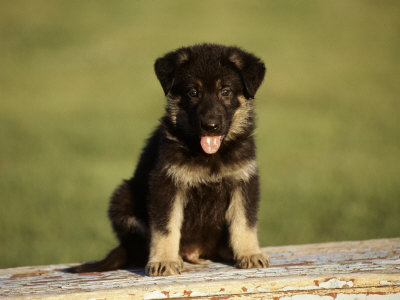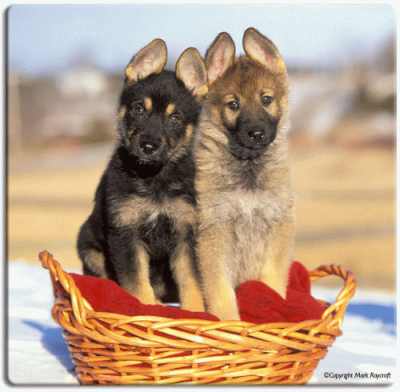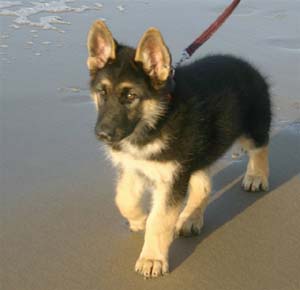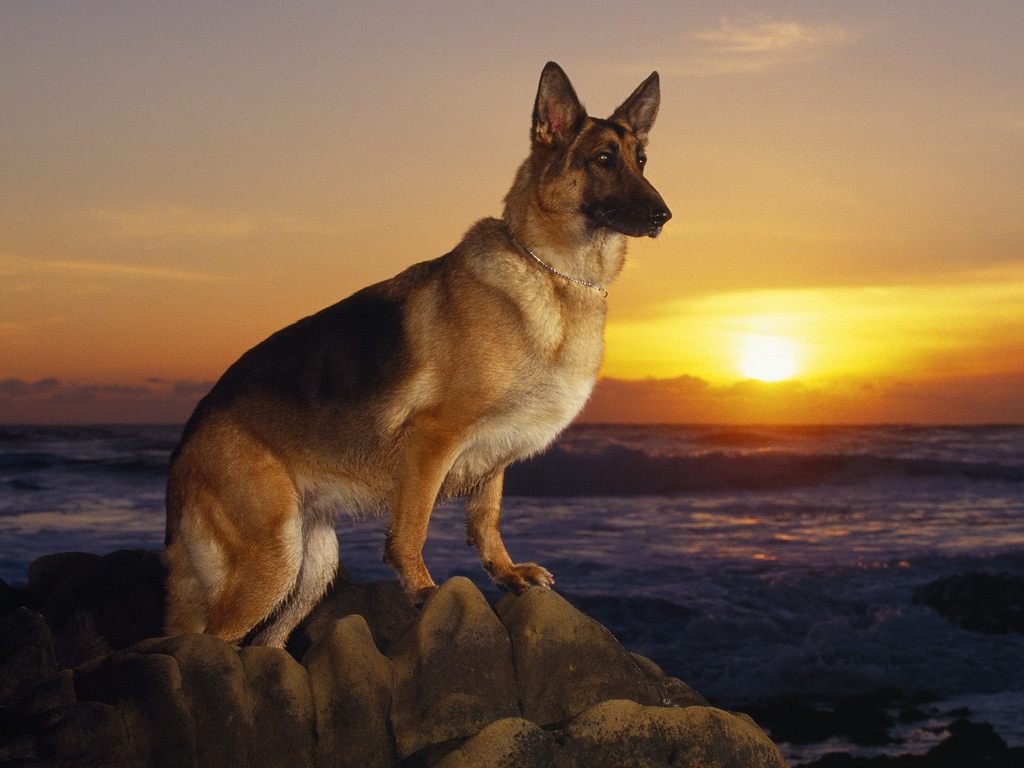
About
German Shepherd
Origin and History
of the Breed
Shepherd dogs from Bavaria,
Thurginia, and Wurtemberg are in the background
of the German Shepherd Dog. These dogs included
a variety of coat types: long-haired, short-haired,
and wire-haired.
In April 1899 the first German
Shepherd Dog was registered. Until 1915 both
long-haired and wire-haired were exhibited.
Most countries only recognize the short-haired
for show purposes today.
|
|
Check Your German Shepherd's Temperament
Training your German Shepherd will be fast, easy and simple, if you
know whether your Dog is aggressive, docile or friendly. Use this Free Dog Personality Test to peek into how your German Shepherd's mind works.A General Appearance of the Dog
The German Shepherd Dog is one
of the most popular and recognizable breeds around
the world. German Shepherd Dogs are well-proportioned,
muscular yet trim dogs with pricked (stand up) ears.
It is agile and quick. The noble-looking German
Shepherd (Alsatian) is well-balanced, longer than
it is tall. The German Shepherd is a black and tan
dog predominantly but can be gray (called blue)
or brown (called liver) with varying amounts of
those colors. (Blue, liver and white cannot be shown
in AKC.) He is usually lighter on the legs and face
with dark accents on the ears. He has almond-shaped
eyes with a lively, intelligent expression. His
bushy tail hangs down.
The German Shepherd is a trotting
dog who moves smoothly and rhythmically, covering
a lot of ground quickly. Its stride is long, quick,
and easy. The hindquarters seem to deliver a power
thrust that propels the front end forward. The dog
can easily spring from its hindquarters, jumping
up or forward to quite a distance.

Personality
Temperament of the Dog
German Shepherds love to be close
to their families and are very loyal and protective
of their families. They are very eager and alert.
They have a high capacity for learning and love
to learn. They are obedient and cheerful and very
seldom show any stubbornness because they are eager
to please.
German Shepherds should not be
left alone for long periods of time. They must be
thoroughly socialized and firmly obedience trained
from an early age and throughout their lives. A
very firm yet loving attitude is necessary with
a Shepherd throughout its life. Normally, Shepherds
are not barkers but will bark as a warning of perceived
danger.
The German Shepherd Dog does not
give affection lightly; it is also known as a "one-man"
breed for its tendency to display serious loyalty
and fidelity, especially to its owner or main caretaker.
He is a bold and punishing fighter if he needs to
be.
German Shepherds are used for
guard work and search and rescue because they are
fearless, direct, calm, confident, and intelligent.
Aggression and attacks are usually a result of poor
breeding or poor adjustment, handling, or training.
If you start young and teach your
puppy its order in your "pack" (all members
of the family have to be Alpha), problems with training
will be minimized. However, German Shepherds tend
to have more dominant personalities than some breeds.
Classes are extremely helpful. A German Shepherd
Dog that thinks it's the Alpha member of the pack
can be difficult to handle or have as a family member.
German Shepherds love jobs. They
are used as guard dogs, in police work, to sniff
out drugs, as guides for the blind and deaf, in
search and rescue, and for military work. As a family
dog, your German Shepherd will enjoy obedience,
agility, flyball, tracking activities, and schutzhund.
Alsatians regularly win advanced obedience and field
trials.
Research carefully before getting
a German Shepherd. Get to know both parents and
any other relatives to make sure of the personality.
Unfortunately some breeders are offering shy and
nervous Alsatians for sale. These dogs should be
avoided at all costs as they can be dangerous. Also,
assess the diseases in the lineage.
Better suited to an indoor
or outdoor lifestyle?
A German Shepherd can be kept
in an apartment, but much prefers living where he
has a fenced yard for exercise. He will enjoy a
brisk, long walk each day – or, after he is
a year old, he can job or go with you when you bike
or rollerblade. If he is underexercised, he will
become destructive (especially as a youngster).
He can be outdoors a large part of the day as long
as he has sufficient time with his family.
Are they suited to homes
with kids?
A well-bred German Shepherd will
do fine in a household with children, especially
older children. He will need daily exercise and
some activity to keep his mind busy. Children should
be taught how to handle the dog and not to hit or
yell at him.
Activity
Level
How active is the Breed?
The German Shepherd is very active
throughout his life; however, he is fairly quiet
when indoors. He will need daily exercise and some
activity to keep his mind busy.
Exercise Need
German Shepherd puppies will be
pretty rambunctious. Outdoor play and some training
(like obedience) will help to keep his body and
mind busy. He will enjoy a brisk, long walk each
day – or, after he is a year old, he can job
or go with you when you bike or rollerblade. If
he is underexercised, he will become destructive
(especially as a youngster).
Grooming
All three coat types are shed
throughout the year with heavy shedding in spring
and fall. Weekly brushing is a must with daily brushing
during the spring and fall.
Grooming
your dog yourself, at your home and at your convenience will help you build
a strong bond with your German Shepherd. You will not only save yourself the
hassle of taking him to a groomer regularly, you save some money too.
Coat Color
The German Shepherd is a black
and tan dog predominantly but can be gray (called
blue) or brown (called liver) with varying amounts
of those colors. He is usually lighter on the legs
and face with dark accents on the ears.
Note: White German
Shepherds are now considered a separate breed called
the American White Shepherd.
Coat Type
There are three coat types: rough
(relatively short with undercoat), long rough (longer
with undercoat), and long-haired (without undercoat).
The correct German Shepherd Dog
coat is relatively short with an obvious undercoat.
This is quite waterproof. Some dogs are born with
long coats which usually, though not always, are
devoid of undercoat. Such coats are more difficult
to groom, but many pet owners seem to like the long-coated
version. The normal coat is dominant to the long
version, so there are three kinds of coat: normal,
normal but carrying the long coat gene, and long.
About 10% of the pups are born long-coated.
Health
and Care
Genetic Problems
Hereditary diseases include hip
and elbow dysplasia (OFA certification of good on
both parents is essential), blood disorders, digestive
problems, epilepsy, chronic eczema, eye inflammation,
dwarfism and allergies.
Unfortunately some breeders are
offering shy and nervous Alsatians for sale. These
dogs should be avoided at all costs as they can
be dangerous.
Breeding the Dog and any
Cautions
You will want to have your dog’s
hips and elbows certified before breeding.
Litter Size: 8
– 12 puppies
Life Span: 12-14
years.
Weight
75-90 lbs
Height
Males: 24-26 inches
Females: 22-24 inches
Group: AKC Herding Dog Group,
KCGB Pastoral Group
Ranking: 4 in AKC, 4 in KCGB
Also Known As: Alsatians, German
Shepherd, Shepherds.
|




